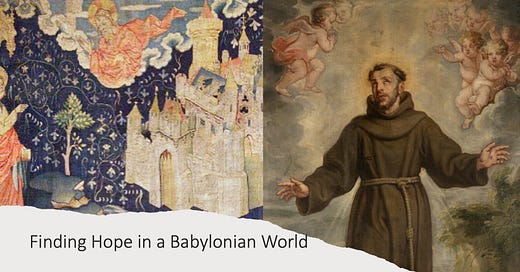Finding Hope in a Babylonian World
October 4, 2023 - Wednesday, Memorial of Saint Francis of Assisi
Psalm 137:1-6
In 1978 the German band “Boney M” came up with a song titled “Rivers of Babylon” that immediately gained popularity. But few realised that the song was based on Psalm 137 and that it was first sang by a Jamaican reggae group as a song of protest against their government.
The historical background of Psalm 137 reflects the tragedy of the destruction of Jerusalem in 586 BC and the subsequent deportation of the Jewish population to Babylon. The Jewish exiles sit beside the canals between the Tigris and Euphrates in Babylon and are asked by their captors to sing “the songs of Zion!” But how could they sing those joyful songs still remembering the atrocities committed by the Babylonians? Instead of joy, tears flew from their eyes. Since that moment, Psalm 137 became a song of protest and “Babylon” began to signify an oppressive power and authority.
At the end of the First letter of Peter, we find this phrase: “She who is at Babylon, who is likewise chosen, sends you greetings” (1 Pet 5:13). The personal pronoun “she” refers to the Church and “Babylon” to Rome. At that time the government of Rome was an enemy of Christianity, and the code name “Babylon” for the capital of the Roman Empire compared the experience of the first Christians with that of the Jewish exiles.
But the refusal to sing the joyful songs of Zion does not indicate forgetting their beloved city. Quite the opposite, Jerusalem would remain for centuries an object of longing. This longing is reflected in the national anthem of Israel, a song written in the 18th century and titled “The Hope”: “Our hope is not yet lost, The hope of two thousand years, To be a free nation in our land, The land of Zion and Jerusalem”.
Reading this part of Psalm 137 (vv. 1-6) from a Christian perspective can lead us to a question: is not our life on this earth a kind of exile? It seems that nothing can satisfy us. No matter how much money or power we have, and how famous we become, our hearts are empty. We long for something that most of us do not even know what it is that we long for. Adding to the fact that Christians are the most persecuted religious group in the world, we can also call the oppressive societies our brothers and sisters live in “Babylon”.
The psalmist says, “If I forget you, Jerusalem, may my right hand wither” (Ps 137:5). If “Babylon” is a code name for an oppressive society, “Jerusalem” stands for God’s world of peace, justice, and prosperity. This world is described with two metaphors: the kingdom of God, and a new heaven and a new earth. Let us never lose hope and never forget God’s promises. Jesus Christ defeated the power of sin and death and has opened for us the way to the fullness of life. To paraphrase the song of hope, we can say that “our hope is not yet lost, the hope of two thousand years, to be a free people in new heaven and earth, in heavenly Jerusalem, our homeland”.




